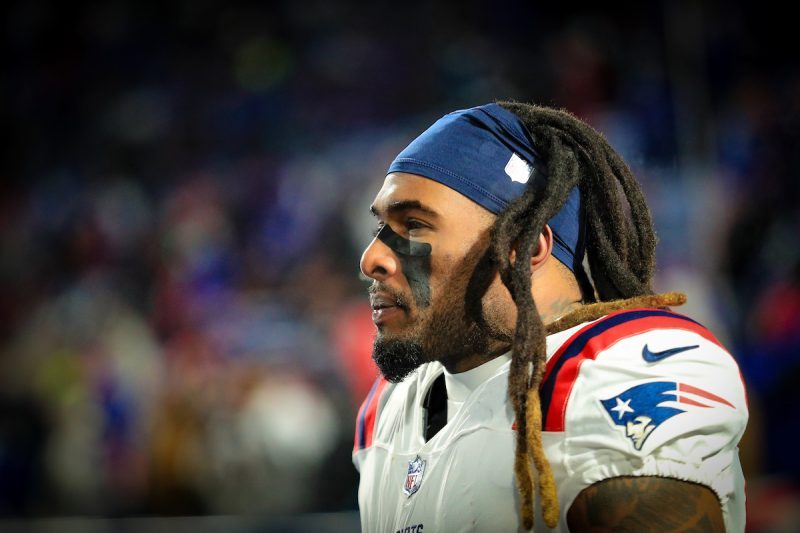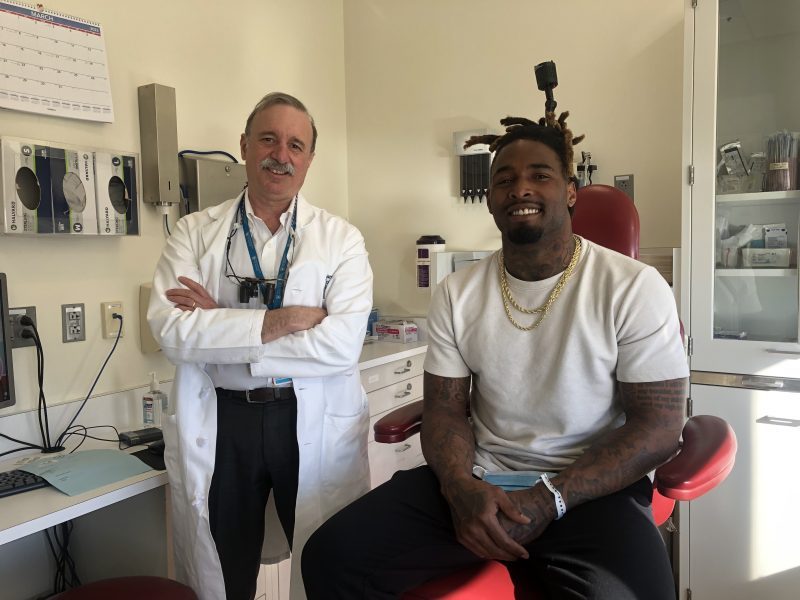Former New England Patriots running back Brandon Bolden was treated at Mass Eye and Ear in 2018 for mucoepidermoid carcinoma. He kept his battle private until last year. Today, he shares his story to raise awareness about head and neck cancer and to urge others to live their lives to the fullest.
Brandon Bolden is no stranger to overcoming obstacles. The Baton Rouge, Louisiana native went from undrafted running back to winning two Super Bowls as a member of the New England Patriots. The nine-year veteran has played eight seasons with the Patriots, one in Miami and he recently signed with the Las Vegas Raiders.
No setback could slow Bolden down. Not even cancer.
When an unexplained growth several years ago eventually turned into an unexpected salivary gland cancer diagnosis, he attacked his surgery and recovery with same the tenacity he’d bring on Sundays. After receiving treatment at Mass Eye and Ear, he was back on the practice field in two short weeks.
“There were a ton of things going through my mind,” Bolden, now 32 and cancer-free, told Focus. “But I didn’t let any of that affect me or define me in any way. I knew life needed to go on, and it was my turn to fight this battle.”
Playing through an unexplained symptom

Bolden is used to giving and taking tough hits – it’s a hallmark of his game. Of the hundreds he’d exchanged throughout his career, one hit in particular changed the course of his young life. It was during the AFC Championship game in 2015 with the Patriots, and he was laying a hard block on a punt return.
Once the play ended, he reached for his neck and noticed an odd growth below his ear lobe.
In the weeks that followed, including a Super Bowl victory, he remembered the growth coming and going on its own, something Bolden chalked up to the wear and tear of playing pro football. Maybe he just needed some fluid drained and he’d deal with it later, he thought.
“Cancer was the last thing I was worried about,” he said. “I thought it was a pocket of fluid, or that maybe I had broken my jaw or even bit the inside of my mouth.”
Months went by and the growth persisted. Instead of seeing a doctor, Bolden concealed it by growing a beard. He did not want the growth to affect his life or career and hid it for three years.
A few seasons later, he made what he described as the same type of hit from three years prior. Except, this time, the pain was incredible. He finally told team doctors about the growth, hoping to get an X-ray. Instead, they referred him for biopsies at Mass Eye and Ear. After the procedures, he headed straight for the airport back home to Louisiana.
“I was sitting in my driveway when one of the team doctors called me with the diagnosis,” he said.
The first thing the father of three young children thought of was how to tell his family.
“Telling my family, that was tough,” said Bolden. “Tough for them and tough for me.”
Uncovering a rare cancer of the salivary gland
Bolden was diagnosed with mucoepidermoid carcinoma, a malignant cancer of the parotid salivary gland. This type of cancer is considered rare by experts; about 80 percent of salivary gland tumors are benign. Signs of parotid gland cancer include a lump in the face, neck or mouth, as well as facial paralysis, numbness, weakness or pain.
The primary treatment is surgery. Left untreated, these tumors can spread to the neck and face and invade its nerves, leading to facial paralysis and other symptoms. The cancer could also spread into the ear causing hearing loss, and eventually to the lymph nodes and other organs.
In Bolden’s case, his tumor was as complex as could be. According to Mark Varvares, MD, FACS, chief of the Department of Otolaryngology–Head and Neck Surgery, the tumor had engulfed Bolden’s facial nerve, which remained fully intact and undamaged. That meant surgery would have to be extremely delicate to remove all the cancer without damaging the nerve.
This was especially crucial given Bolden’s profession. In some cases, doctors might need to completely sever the facial nerve – which runs from the skull, passes through the parotid gland and through the face – to remove the tumor. The tumor might encroach on other nerves, such as the nerve that drives the trapezius muscle through the shoulder, which may at times require removal during resection surgery. In other cases, defects from removing the tumor might require reconstructing portions of the neck using tissue from other parts of the body, such as the thigh or forearm. However, in Bolden’s case, those options were left off the table.
“While our primary goal was to completely remove the cancer, at the same time we in no way wanted to impact Brandon’s ability to play football, so we eliminated those reconstructive options and worked very hard to carefully remove the tumor from his facial nerve,” said Dr. Varvares. “Based on the demands of his profession, preserving function, always an important goal, was front and center as he needed every component of his facial and shoulder muscles spared to do his job properly.”

Complex surgery leads to speedy recovery
A team of Mass Eye and Ear surgeons led by Dr. Varvares would perform the surgery. Dr. Varvares was joined by Tessa Hadlock, MD, director of the Division of Facial Plastic and Reconstructive Surgery and Facial Nerve Center, and Michael McKenna, MD, former chief of Otology and Neurotology. While Dr. Varvares removed the tumor from the neck, Dr. Hadlock helped preserve the facial nerve and Dr. McKenna removed any parts of the tumor that approached the ear.
“One of the things we do really well at Mass Eye and Ear is bring together leaders from different surgical disciplines to ensure optimal outcomes for complex cases,” said Dr. Varvares.
The surgery took over nine hours and was a success. However, because of the work that needed to be done to the nerve, Bolden was left with temporary facial paralysis. He described himself as looking like the villain Two Face from the old Batman cartoons and was unable to close one eye or smile. That didn’t stop him from attending his son’s flag football game soon after and returning to practice within two weeks. To protect his eye on the field, Dr. Hadlock inserted a titanium weight to help the eyelid close.
When Bolden returned to Mass Eye and Ear for his follow-up exam, the doctors found no evidence of cancer. In just a few months, his facial paralysis would completely recover, and the titanium would be removed. Follow-up scans in the years since revealed no signs of a recurrence: Bolden is cancer-free.
“I can’t say thank you enough times, there’s just no way possible to thank so many people. I just want to give everyone a big hug, a big bear squeeze,” Bolden said. “I could never put into words how much I appreciate them and all they’ve done for me.”

Recovery breeds new outlook on life
After surgery, Bolden recovered on the 11th floor inpatient unit of Mass Eye and Ear, where he recalled the “amazing” nurses and medical staff who made his stay an easy one. He’d take laps on the floor to get exercise, walking around with two tubes sticking out of his neck, as he put it. On those walks, he encountered an older gentleman with six tubes coming out of his neck who rounded those same halls in the opposite direction.
Eventually the two walked together and formed a bond, joining each other for juice and ice pop excursions. One day, Bolden was feeling down on himself thinking, “Why me?”, but noticed his new friend chipper as can be. When Bolden asked why, the man offered a response that has stuck with him to this day: “I’d rather have six tubes coming out of my neck than be in a wooden box.” That was a “life-changing” moment Bolden recalled, and he adopted that attitude towards his experience ever since. He strived to live everyday life to its fullest.
“Brandon has not been impaired by this tumor long-term, which is a testament to his training and desire to not let his cancer treatment change how he lives his life,” said Dr. Varvares. “He’s an amazingly humble and generous person and by sharing his inspirational story and helping others going through similar struggles, he is doing a great service for cancer patients.”
An inspiration to many

Today, Bolden considers himself more healthy and fit than ever before. He credits his teammates and coaches, many of whom first learned about his story on social media and from an interview in The Boston Globe, for helping him overcome the odds to return to football.
“Without them I don’t think I could have made it all the way through the way I did and continued to play,” he said.
Since sharing his experience, he’s received countless messages from people with cancer who have been inspired by his story. When a member of the Patriots front office was battling cancer, it was Bolden who she confided in, updating him on all her appointments. One person who read his story messaged him that he hid a skin tag for 15 years but finally got it checked out after reading about Bolden’s journey. That man ended up having skin cancer, which was removed the same day.
“I just feel like if I can be a hope for few people, I’ll be there,” he said.
The journey has changed his entire outlook on life.
“It’s a hell of an experience and it made me appreciate the little things in life,” he said. “You should never take a smile for granted.”
Great story – great ending – ME&E is the place to be when it’s your turn – no question!